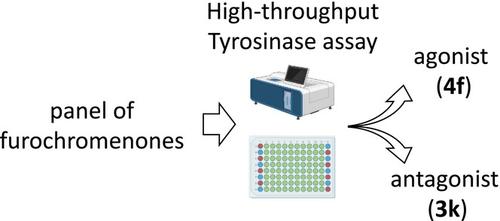对作为酪氨酸酶激活剂和抑制剂的一组呋喃色烯酮进行评估。
IF 3.2
4区 医学
Q2 BIOCHEMISTRY & MOLECULAR BIOLOGY
引用次数: 0
摘要
酪氨酸酶是一种含铜酶,参与黑色素的生物合成。黑色素生成过多会导致人体皮肤色素沉着,而色素沉着过少则会导致白癜风等疾病。酪氨酸酶抑制剂可用作高效的皮肤美白剂,而酪氨酸酶激动剂则可用于促进黑色素合成和保护皮肤免受紫外线照射。在各种酪氨酸酶调节化合物中,已知呋喃色原酮的天然和合成衍生物,如 8-甲氧基补骨脂素(8-MOP),既能激活又能抑制酪氨酸酶。我们最近报道了一种在无金属条件下生成多种二氢呋喃并[3,2-c]色烯酮和呋喃并[3,2-c]色烯酮的合成方法。在本研究中,我们研究了这些化合物作为酪氨酸酶拮抗剂或激动剂的潜力。通过基于真菌酪氨酸酶的体外生化试验,我们得到了一种能抑制酪氨酸酶活性的化合物(3k)和另一种能刺激酪氨酸酶活性的化合物(4f)。动力学研究表明,化合物 3k 对酪氨酸酶产生了 "混合 "型抑制作用,而 4f 则刺激了酪氨酸酶的催化效率。研究这些化合物的机理可为开发新的有效酪氨酸酶抑制剂或激活剂提供依据。本文章由计算机程序翻译,如有差异,请以英文原文为准。

Evaluation of a panel of furochromenones as the activator and inhibitor of tyrosinase.
Tyrosinase is a copper-containing enzyme involved in the biosynthesis of melanin pigment. While the excess production of melanin causes hyperpigmentation of human skin, hypopigmentation results in medical conditions like vitiligo. Tyrosinase inhibitors could be used as efficient skin whitening agents and tyrosinase agonists could be used for enhanced melanin synthesis and skin protection from UV exposure. Among a wide range of tyrosinase-regulating compounds, natural and synthetic derivatives of furochromenones, such as 8-methoxypsoralen (8-MOP), are known to both activate and inhibit tyrosinase. We recently reported a synthetic approach to generate a variety of dihydrofuro[3,2-c]chromenones and furo[3,2-c]chromenones in a metal-free condition. In the present study, we investigated these compounds for their potential as antagonists or agonists of tyrosinase. Using fungal tyrosinase-based in vitro biochemical assay, we obtained one compound (3k) which could inhibit tyrosinase activity, and the other compound (4f) that stimulated tyrosinase activity. The kinetic studies revealed that compound 3k caused 'mixed' type tyrosinase inhibition and 4f stimulated the catalytic efficiency. Studying the mechanisms of these compounds may provide a basis for the development of new effective tyrosinase inhibitors or activators.
求助全文
通过发布文献求助,成功后即可免费获取论文全文。
去求助
来源期刊

Chemical Biology & Drug Design
医学-生化与分子生物学
CiteScore
5.10
自引率
3.30%
发文量
164
审稿时长
4.4 months
期刊介绍:
Chemical Biology & Drug Design is a peer-reviewed scientific journal that is dedicated to the advancement of innovative science, technology and medicine with a focus on the multidisciplinary fields of chemical biology and drug design. It is the aim of Chemical Biology & Drug Design to capture significant research and drug discovery that highlights new concepts, insight and new findings within the scope of chemical biology and drug design.
 求助内容:
求助内容: 应助结果提醒方式:
应助结果提醒方式:


